20 years ago, I discovered how to make a living in sports betting. It's called sports trading!
I mastered reading the tape and betting charts to trade sports betting odds for a living, making my first 6-figure paycheck as a betting odds trader!
What is Sports Trading?
Sports trading refers to the practice of buying and selling sports bets, similar to how traders buy and sell stocks on the stock market. This can be done on sports betting exchanges. These online platforms allow people to place bets against one another rather than against a traditional bookmaker.
The basic idea behind sports trading is to take advantage of the fluctuation in betting odds.
This can occur before and during a sporting event. Betting odds traders aim to buy at a lower price and sell at a higher price.
Doesn't that sound similar to the stock market? Traders can do this by using trading strategies such as hedging, swing trading, scalping, and arbitrage.
These strategies are very well-known in the stock market. Let's see how they apply to sports trading.
At some point, I suggested Betfair use charts resembling those of a stock exchange!
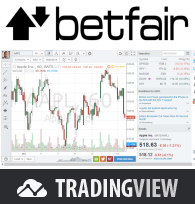
Betfair Trading Strategies
These universal sports trading strategies can be followed in all kinds of betting exchanges, but given Betfair's popularity, people are usually looking specifically for a Betfair strategy to apply in their betting or trading.
- Hedging involves placing bets on different outcomes of the same event to limit losses. For example, if a betting odds trader believes that a certain team will win a match, they might bet on that team to win. However, they might also place a smaller bet on the opposing team to win in case their original bet loses. This limits the potential loss and allows the sports betting odds trader to lock in a profit.
- Swing trading is a trading strategy where traders capitalize on larger price movements by holding positions for a longer period, often throughout the event. This requires predicting market trends and identifying when prices are likely to rise or fall.
- Scalping refers to the practice of placing multiple small bets on the same event in an attempt to make a small profit on each trade. Scalpers try to capitalize on small fluctuations in odds before and during the event and usually close their positions quickly. This is the type of trading strategy I applied as an odds trader.
- Arbitrage involves taking advantage of differences in odds between different sports betting online platforms. This can happen when an odds trader identifies that the odds on one platform are higher than on another for the same event. They can then place bets on both platforms, profiting from the difference in odds.
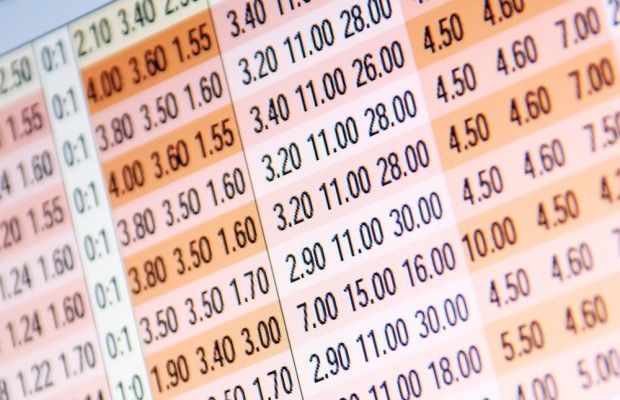
Sports trading can be applied in almost any sports market, even in financial and political betting or special bets, such as TV shows and music contests! While sports trading can be a way to make money, it is important to note that it also involves risk and requires a deep understanding of the sport and betting markets.
Many people make a living from sports trading, but many more lose money. It can be a high-risk venture. Successful traders are often more experienced and familiar with the nuances of sports and odds. They also employ advanced mathematical models to give them an edge.
My career as a sports betting odds trader
Trading betting odds on an Internet browser in 2007
Personally, I went full-time sports trading in 2004 and quit in 2007. During those years as a sports betting odds trader, I traded millions in horse racing markets and gained experience that helped me make a move to stock and forex trading.
At the peak of my sports trading career, I traded 10+ million euros in a single month.
Read on to find out how I started as a sports betting odds trader, my bankroll requirements, my advice on money management, and tips on how to improve your predictions and how to use betting charts.
People very often ask me for advice on how to start sports trading. I now give them a link to this very article. If you read the lines below, you will know:
- how much money you need;
- how to apply money management, and;
- what to avoid in your first steps in sports trading.
Yet, you still need to predict the market correctly if you were to become a profitable sports betting odds trader. I tried to explain that by showing my trading style in numerous videos I uploaded on YouTube. The video that attracted the most viewers is this, so I guess it will appeal to you the most, as well.
How I started in sports trading
I found betting exchanges in 2004.
I used to bet the regular way in online bookmakers till then, and like most, I initially found it challenging to understand what was going on in a betting exchange. Odds were moving up or down; money was waiting to be ‘matched,’ and we could act as bookmakers ourselves! Chaos drove me away in the beginning.
Little did I know I would return two weeks later and become a full-time sports betting odds trader!
That happened when I bumped into a video online where a sports betting odds trader explained how he was making money by trading horse racing betting odds. He bragged that he rarely had a losing day!
You know the saying: when something seems too good to be true, it’s because it is.
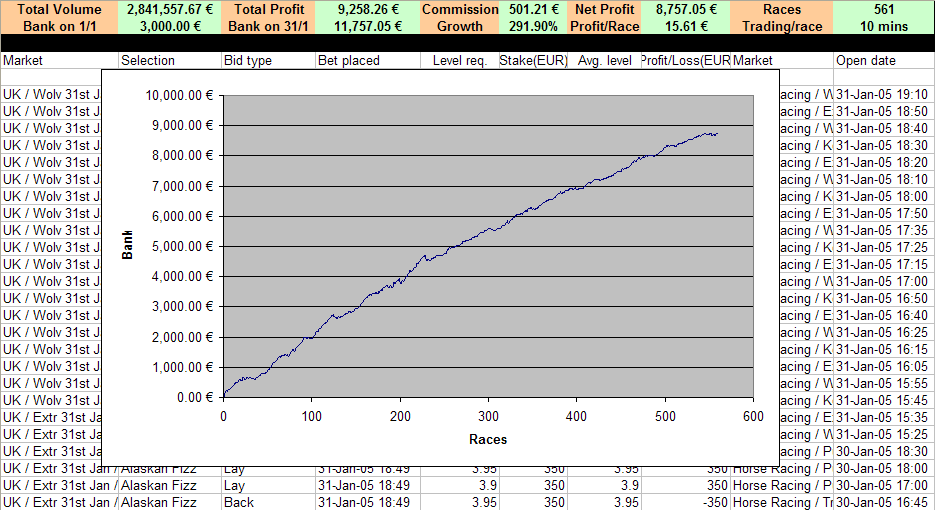
How much money did I need as a beginner sports betting odds trader?
Adam Todd, the odds trader in question, made me spend considerable time on comprehending the betting exchange’s mechanics. Finally, after watching his video repeatedly, I pulled the plug and deposited my first 500 euros in Betfair, the leading betting exchange at the time.
That was the first and only deposit I made in the betting exchange.
The kind of trading Adam showed, and I built my skills upon, is called scalping.
What's the most important thing in scalping?
Scalping betting odds with third-party software in 2007
Scalping is trading minuscule odds movements, making small but constant profits. Imagine buying oranges for $2 and selling them for $2.04 ten seconds later. Yes, scalping is trading on steroids (note: I wrote this on another website).
You need speed for scalping.
No, a 24Mbps internet connection does not guarantee the speed I am talking about. It’s the lowest ping you should be after.
Ever played a video game online and experienced lag? Those milliseconds that cost you a virtual ‘kill’ may mean hundreds of dollars in sports trading and scalping in particular.
Now comes the best part: I began scalping with a 56Kbps dial-up internet connection. 🤯
Odds were refreshing every 2 seconds minimum. At times, I submitted orders and didn’t know what was happening for about 5 or 10 seconds! I'm talking about the dark ages. I feel like a dinosaur just by typing this!
Making money every week as an odds trader
Even under those circumstances, I managed to double my bankroll during the first month of sports trading. Yet, it was apparent I was handicapping myself.
Upon installing a broadband internet connection a month later, my win rate skyrocketed. I did have losing days, but I never had a losing month; much like Adam. Skillful betting odds traders could actually make money in almost every horse race!
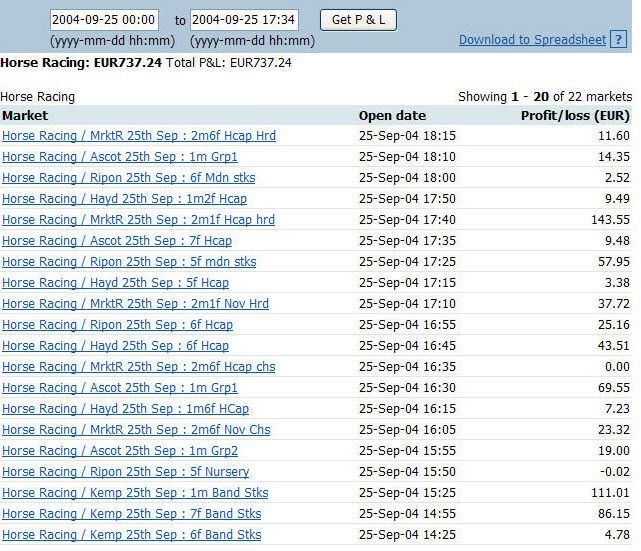
The best handicappers and sports bettors could not beat that. The best sports betting strategy can have days in the red. Sports trading was an entirely different beast.
Sports trading mistakes to avoid as an odds trader
Losing money while trading sports betting odds
Losing money when scalping means you didn’t trade well. You made wrong predictions, chased your losses, or had a bad internet connection.
I cannot think of another reason to lose money.
No, the rule of “cutting your losses short and letting your winners run” does not apply in scalping. That’s because you always cut your losses short and seldom let winners run in scalping. Thus, if you do not cut your losses early on, you are not scalping but gambling.
- Dire predictions: In scalping, like in trading, you make money when you correctly predict odds movements. If you constantly trade in the wrong direction, you will be broke. In scalping, you suffer many small losses instead of scoring many small wins. By improving your predictions in scalping, you increase the win/lose ratio, not the money won/lost per trade. This means you will ultimately have many more winning trades, yet the net amount won per trade will remain about the same. I’ll explain later how I improved my predictions in horse racing and in pretty much any other market I traded.
- Chasing your losses: This is a lack of discipline. Being a scalper, sports trader, position trader, or investor, chasing your losses is one of the most significant leaks. This leak can and will bring any profitable trading strategy to its knees. Chasing losses is found in any form of gambling; therefore, if you catch yourself doing that, you are not ready yet for sports trading. Because of the high betting frequency in sports trading, your lack of discipline can have a devastating result in a much shorter time. Make sure you are not prone to tilting and losing your temper, before delving into sports trading.
- Lousy internet connection: This doesn’t need much explanation. If your internet goes down during a trading session, you are toast. You should have a backup plan in case of such an emergency, which usually includes a backup internet connection. That second connection does not need to be that fast, but it should be reliable. Its main and only goal is for you to close your open trades with that and exit the market.
In fact, there is another reason to lose money in sports trading before the horse race starts, but I needed a headline instead of a bulleted list to address it. That's because it's the worst mistake you can do as an odds trader!
Never go in-play when sports trading
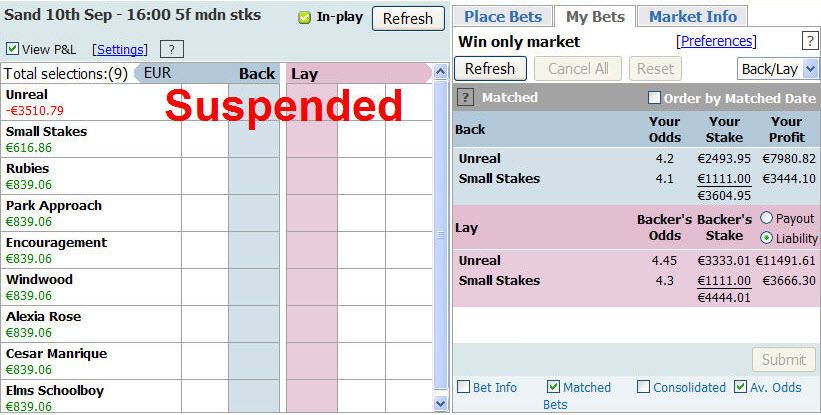
Unless you were supposed to trade in-play, letting a trade open on the race’s official starting time is a recipe for disaster. But why would you do that in the first place?
- You are losing more than you expected in the regular trading session and are looking to gamble a bit to recoup your losses quickly.
- You are aiming for that one tick to get out of the market, but the odds seem to have come to a halt.
- Races start at a specific time, which you missed. Although today’s trading software sets alarms on for you to avoid that error, you’d be surprised how often traders neglect to keep an eye on their clock!
Whatever the reason leading you to let a trade go in play, restrain yourself from doing it ever again! Accept your loss, take your one-tick-less profit, and move on to the next horse race. Trading never ends; the next opportunity is just a click away.
You have no excuse to put your bankroll in such a high-risk environment.
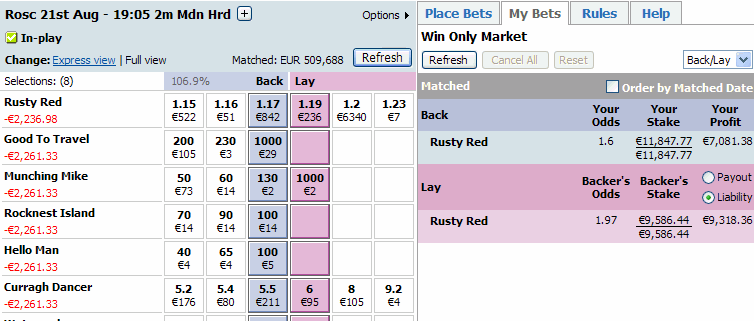
In-play sports trading demands a different approach and certainly puts you at a severe disadvantage when you are risking 50% or 100% of your trading capital! And speaking of capital, let’s say a few words about money management.
How much money do you need as a sports betting odds trader?
Sports trading on Mozilla Firefox
As little as possible! Since you are reading this, I assume you are, at best, an amateur in sports trading. Therefore, you should invest the minimum amount of money until you become familiar with sports trading. Why?
Because, as they say, you will lose that money – consider it tuition towards your trading studies to become an odds trader. So, why spend much when a few hundred dollars can teach you the same lessons?
I myself began with just 500 euros, although I had studied financial trading and chart analysis. I had proven myself that I was disciplined enough in gambling, as well.
What makes you think you will win from Day One without ever reading a trading book?
Remember that practice beats every book, but you do need some background to get your feet off the ground.
After allocating a specific amount of money for your trading endeavors, you should manage that money properly.
How to do that? Jump over to my sports trading’s money management article. Then come back.
Did you read that?
Ok, now you know perfectly well what I did in order to become a successful sports betting odds trader and get interviewed by popular sports websites. In fact, this particular interview of mine has become quite popular, and you can find more details of my sports odds trading career in that post.
A career that ended in 2007. But that doesn't mean other sports odds traders stopped making money.
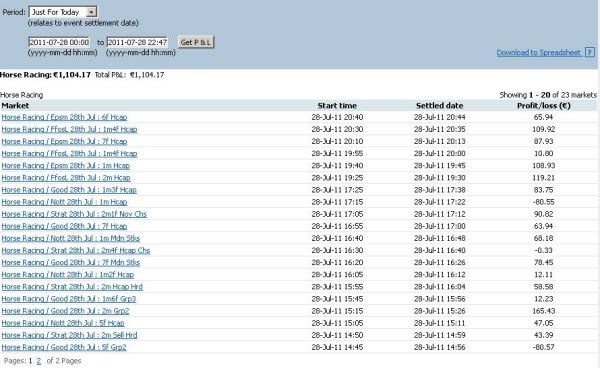
The Curse of a Professional Gambler
Gambling and investing usually present themselves with many money-making opportunities. Unfortunately, those opportunities do not seem to last for long.
When the word gets out and more fishermen join the pod, fish become extinct.
The edge is severely affected, and sometimes the market has balanced itself so much that there’s no edge at all anymore! On the other hand, old betting strategies fail while new ones prosper!
That’s what happened in my sports trading.
More traders with fast internet connections joined the party, more astute bettors converted to traders, and more sophisticated sports trading strategies emerged to beat the old-fashioned ones. I had to evolve, much like I evolved after casinos barred me from playing blackjack (due to me card counting).
And that is the curse of a professional gambler:
Adapt or die.
I adapted by taking a look at another opportunity emerging at those times. That opportunity would allow me to go back to playing cards again. I became a full-time poker player.
SPORTS TRADING TOOLS AND RESOURCES
Technical analysis on sports betting odds charts
In my opinion, you stand a better chance if you study stock markets and technical analysis (here’s my advice on how to move from sports trading to stock trading). You’ll better comprehend market depth’s behavior and be able to pick better spots to back or lay after learning chart analysis. With that in mind, here are some resources I strongly recommend you spend some time on.
Don’t forget that any form of trading is a psychological battle between supply and demand.
Now, for the tools that helped me make money and bankroll the business, I'm running 20 years later!
Sports trading software and tools
In modern sports trading, sophisticated and advanced sports trading software is necessary. Otherwise, competition will always be a step ahead. This software offers chart analysis, instant order placement, and greening-up functionality, to name just a few of their advantages.
Before you decide which software you will use in sports trading, make sure you time-trial it. Also, do not be afraid to share your credentials with officially approved sports trading software vendors and avoid sketchy ones.
The following list includes software I have personally tried and used over the years.


